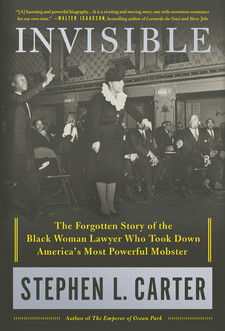Podcast: Professor Stephen Carter is Still Writing His Story

When Professor Stephen L. Carter ’79 sat down with Dean Heather K. Gerken this spring for the Inside Yale Law School podcast, the conversation frequently returned to one topic: the written word.
Carter tells Gerken how he went from being a kid who filled dime-store notebooks with Hollywood-style fantasies to teaching law. And why, after 42 years in the classroom, he sees teaching as a kind of writing project — one that brings him great joy.
Carter is the William Nelson Cromwell Professor of Law at Yale Law School, where he has been a member of the faculty since 1982. Among his recent courses are Contracts, Evidence, Law and Religion, the Ethics of War, Slavery and the Law, and Libertarian Legal Theory.
A prolific writer, Carter is the author of 15 books. His works include scholarly volumes on subjects like religion, politics, and race. He is also the author of six novels, including murder mysteries — one of which recently became a TV series — and a fictional account of Abraham Lincoln’s impeachment. He also writes a regular column for Bloomberg.
Students In Sweater Vests and the Poetry of the Classroom (5:35)

Carter finds energy in the classroom from his students. He tells how one group surprised him in his Contracts class on his birthday. But initially he didn’t notice, which “is also a measure of how … I’m not always as in touch with what’s going on around me as others are.”
He also shares why the end of the school year makes him feel like a detective in a Raymond Chandler novel after solving a mystery.
“I think of the teaching as a literary project. It is a poem in progress.”
What Thurgood Marshall Taught Him (16:44)
Carter recalls his clerkship with Supreme Court Justice Thurgood Marshall, about whom he wrote in an essay and a Commencement address. Carter said what struck him most from that time was how Marshall could find humanity everyone — even segregationists.
“I think the lesson he was trying to teach us was that if you see these people who you disagree with only as evil, then you can't do business with them. And he thought that the law is about — it’s not about winning or losing. It’s about doing business.”
Related:
What Thurgood Marshall Taught Me (The New York Times)
2018 Yale Law School Commencement Remarks
His Grandmother’s Extraordinary — and Previously Overlooked — Story (10:10)

Carter discusses his book, Invisible: The Forgotten Story of the Black Woman Lawyer Who Took Down America's Most Powerful Mobster. The book tells how Carter’s grandmother, Eunice Hunton Carter, masterminded the strategy that brought down mobster Lucky Luciano in 1936. Carter shares how he realized that his family’s story deserved a wider audience.
“I had always heard from my parents these stories about my grandmother and this prosecutor and things that she did, but I'd never really focused on them … They were speaking about a Black woman in the 1930s who was an organized crime prosecutor as part of Tom Dewey's special organized crime unit. There were 19 white males and this one Black woman.”
Related:
“A vivid portrait of a remarkable woman” (Kirkus Reviews)
Why Oat Milk Pricing Matters and Other Explorations (13:38)
Carter reveals how he comes up with material for his column for Bloomberg, which has covered topics ranging from Tik Tok to Supreme Court rulings to professional sports. Another go-to topic is words themselves.
In one recent column, Carter tackled the lawsuit over a national coffee chain charging extra for nondairy creamers. He says the case speaks to one of the central tensions many people feel about government.
“Like so many questions we don't pay a lot of attention to, it is a fascinating tension between our sense of regulation, which we could call government power, and our sense of freedom … which is a good and constant tension in government, in everyday life, and a tension … that I am interested in writing about a lot.”
Related:
“Dunkin’ Donuts Lawsuit Offers a Bizarre Theory of Markets” (Bloomberg)

Addressing Big Ideas Through Fiction (33:11)
Carter discusses his 2003 bestselling novel, The Emperor of Ocean Park, which has since been turned into a TV series. Carter tells how the book, about the mysterious death of a Black judge, was a way for him to explore ideas about race and class. He describes a scene in which a prominent Black lawyer is questioned by police about being at the beach in her wealthy neighborhood.
“And those little bits, I think, are really important to the complexity of the story … When people ask — you know, they look at a Black person who's earned a lot of money, has a fancy house or two houses or whatever — and say, why is this person still complaining about race, that's why, because things like that really happen.”
The Book That People Still Ask About (25:21)
Gerken asked Carter which of his nonfiction works is the most enduring. He tells how his 1999 book on civility continues to strike a chord with people.
“One of the things I tried to argue in the book, and something that people appreciated — they said things like, ‘I didn't think about it that way’ — was … civility is not a matter of one's manners, although I do believe in good manners. I said that civility is the sum of the sacrifices that we make for the sake of living a common life.”
Related:
Civil Thoughts on Uncivil Times: Stephen Carter (Yale Divinity School Reflections, 2012)


